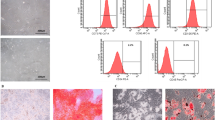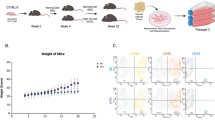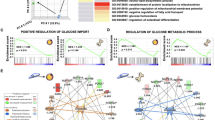Abstract
Mesenchymal stem cells (MSCs) hold great promise for use in cell-based therapies because of their multipotency and simple methods for in vitro expansion. However, during in vitro expansion, MSCs will age and lose their multipotency and proliferation capability. Previous studies have reported that calorie restriction (CR) increases proliferation of MSCs and decreases apoptosis. Therefore, in this study, we examined the effect of low glucose (LG) on human bone marrow-derived MSCs. Proliferation under low glucose (LG, 1.4 mM) conditions was compared with that under normal glucose (NG, 5.5 mM) conditions. In addition, comparative studies of population doubling (PD), β-galactosidase (β-GAL) activity, reactive oxygen species (ROS) generation and differentiation capacity (osteocytes and adipocytes) in NG and LG conditions were performed. In addition, protein expression patterns were compared between NG and LG conditions and several proteins were found to be up- or down-regulated under the glucose restriction condition (LG condition). As a result, CR does not seem to have a significant effect on proliferation, ROS generation, glucose consumption concentration, population doublings, and adipogenic differentiation of MSCs. Interestingly, however, the differentiation potential into osteocytes was maintained under CR and a lower senescence-associated β-galactosidase (β-GAL) activity was observed under CR than under the NG condition. In addition, we determined three up-regulated proteins (aldehyde dehydrogenase, neuropolyprptide h3, and prolyl 4-hydroxylase alpha subunit) and seven down-regulated proteins (laminin-binding protein, actin, sec 13 protein, alpha soluble N-ethylmaleimide-sensitive fusion protein (NSF)- attachment protein (SNAP), manganese superoxide dismutase, proteasome alpha 1 subunit, and ribosomal protein S12) via two-dimensional electrophoresis analysis. These results imply that differentially expressed proteins under the LG condition may provide further information on the aging and differentiation of stem cells.







Similar content being viewed by others
References
Arsova-Sarafinovska Z.; Matevska N.; Petrovski D.; Banev S.; Dzikova S.; Georgiev V.; Sikole A.; Sayal A.; Aydin A.; Suturkova L.; Dimovski A. J. Manganese superoxide dismutase (MnSOD) genetic polymorphism is associated with risk of early-onset prostate cancer. Cell Biochem Funct 26: 771–777; 2008.
Bonab M. M.; Alimoghaddam K.; Talebian F.; Ghaffari S. H.; Ghavamzadeh A.; Nikbin B. Aging of mesenchymal stem cell in vitro. BMC Cell Biol 7: 14; 2006.
Chen L.; Shen Y. H.; Wang X.; Wang J.; Gan Y.; Chen N.; LeMaire S. A.; Coselli J. S.; Wang X. L. Human prolyl-4-hydroxylase alpha(I) transcription is mediated by upstream stimulatory factors. J Biol Chem 281: 10849–10855; 2006.
Colman R. J.; Anderson R. M.; Johnson S. C.; Kastman E. K.; Kosmatka K. J.; Beasley T. M.; Allison D. B.; Cruzen C.; Simmons H. A.; Kemnitz J. W.; Weindruch R. Caloric restriction delays disease onset and mortality in rhesus monkeys. Science 325: 201–204; 2009.
Friedenstein A. J.; Latzinik N. W.; Grosheva A. G.; Gorskaya U. F. Marrow microenvironment transfer by heterotopic transplantation of freshly isolated and cultured cells in porous sponges. Exp Hematol 10: 217–227; 1982.
Grimmer C.; Balbus N.; Lang U.; Aigner T.; Cramer T.; Muller L.; Swoboda B.; Pfander D. Regulation of type II collagen synthesis during osteoarthritis by prolyl-4-hydroxylases: possible influence of low oxygen levels. Am J Pathol 169: 491–502; 2006.
Gupta A. K.; Lee Y. J.; Galoforo S. S.; Berns C. M.; Martinez A. A.; Corry P. M.; Wu X.; Guan K. L. Differential effect of glucose deprivation on MAPK activation in drug sensitive human breast carcinoma MCF-7 and multidrug resistant MCF-7/ADR cells. Mol Cell Biochem 170: 23–30; 1997.
Hammerman P. S.; Fox C. J.; Thompson C. B. Beginnings of a signal-transduction pathway for bioenergetic control of cell survival. Trends Biochem Sci 29: 586–592; 2004.
Jager M.; Wild A.; Lensing-Hohn S.; Krauspe R. Influence of different culture solutions on osteoblastic differentiation in cord blood and bone marrow derived progenitor cells. Biomed Tech (Berl) 48: 241–244; 2003.
Javazon E. H.; Beggs K. J.; Flake A. W. Mesenchymal stem cells: paradoxes of passaging. Exp Hematol 32: 414–425; 2004.
Kamino H.; Hiratsuka M.; Toda T.; Nishigaki R.; Osaki M.; Ito H.; Inoue T.; Oshimura M. Searching for genes involved in arteriosclerosis: proteomic analysis of cultured human umbilical vein endothelial cells undergoing replicative senescence. Cell Struct Funct 28: 495–503; 2003.
Kanfi Y.; Peshti V.; Gozlan Y. M.; Rathaus M.; Gil R.; Cohen H. Y. Regulation of SIRT1 protein levels by nutrient availability. FEBS Lett 582: 2417–2423; 2008.
Kim H. J.; Kim M. R.; So E. J.; Kim C. W. Comparison of proteomes in various human plasma preparations by two-dimensional gel electrophoresis. J Biochem Biophys Methods 70: 619–625; 2007.
Kim J. S.; Kim E. J.; Kim H. J.; Yang J. Y.; Hwang G. S.; Kim C. W. Proteomic and metabolomic analysis of H(2)O(2)-induced premature senescent human mesenchymal stem cells. Exp Gerontol 46: 500–510; 2011.
Knirsch L.; Clerch L. B. Tyrosine phosphorylation regulates manganese superoxide dismutase (MnSOD) RNA-binding protein activity and MnSOD protein expression. Biochemistry 40: 7890–7895; 2001.
Lee Y. J.; Galoforo S. S.; Berns C. M.; Chen J. C.; Davis B. H.; Sim J. E.; Corry P. M.; Spitz D. R. Glucose deprivation-induced cytotoxicity and alterations in mitogen-activated protein kinase activation are mediated by oxidative stress in multidrug-resistant human breast carcinoma cells. J Biol Chem 273: 5294–5299; 1998.
Levchenko A. Proteomics takes stem cell analyses to another level. Nat Biotechnol 23: 828–830; 2005.
Li S. Y.; Gomelsky M.; Duan J.; Zhang Z.; Gomelsky L.; Zhang X.; Epstein P. N.; Ren J. Overexpression of aldehyde dehydrogenase-2 (ALDH2) transgene prevents acetaldehyde-induced cell injury in human umbilical vein endothelial cells: role of ERK and p38 mitogen-activated protein kinase. J Biol Chem 279: 11244–11252; 2004.
Lo T.; Ho J. H.; Yang M. H.; Lee O. K. Glucose reduction prevents replicative senescence and increases mitochondrial respiration in human mesenchymal stem cells. Cell Transplant 20: 813–825; 2011.
Mecham R. P. Laminin receptors. Annu Rev Cell Biol 7: 71–91; 1991a.
Mecham R. P. Receptors for laminin on mammalian cells. FASEB J 5: 2538–2546; 1991b.
Mulligan J. D.; Schmuck E. G.; Ertel R. L.; Brellenthin A. G.; Bauwens J. D.; Saupe K. W. Caloric restriction does not alter effects of aging in cardiac side population cells. Age 33: 351–361; 2011.
Park H. W.; Shin J. S.; Kim C. W. Proteome of mesenchymal stem cells. Proteomics 7: 2881–2894; 2007.
Poon H. F.; Shepherd H. M.; Reed T. T.; Calabrese V.; Stella A. M. G.; Pennisi G.; Cai J.; Pierce W. M.; Klein J. B.; Butterfield D. A. Proteomics analysis provides insight into caloric restriction mediated oxidation and expression of brain proteins associated with age-related impaired cellular processes: mitochondrial dysfunction, glutamate dysregulation and impaired protein synthesis. Neurobiol Aging 27: 1020–1034; 2006.
Portero-Otin M.; Pamplona R.; Bellmunt M. J.; Ruiz M. C.; Prat J.; Salvayre R.; Negre-Salvayre A. Advanced glycation end product precursors impair epidermal growth factor receptor signaling. Diabetes 51: 1535–1542; 2002.
Procaccio V.; Salazar G.; Ono S.; Styers M. L.; Gearing M.; Davila A.; Jimenez R.; Juncos J.; Gutekunst C. A.; Meroni G.; Fontanella B.; Sontag E.; Sontag J. M.; Faundez V.; Wainer B. H. A mutation of beta -actin that alters depolymerization dynamics is associated with autosomal dominant developmental malformations, deafness, and dystonia. Am J Hum Genet 78: 947–960; 2006.
Shevchenko A.; Chernushevich I.; Ens W.; Standing K. G.; Thomson B.; Wilm M.; Mann M. Rapid ‘de novo’ peptide sequencing by a combination of nanoelectrospray, isotopic labeling and a quadrupole/time-of-flight mass spectrometer. Rapid Commun Mass Sp 11: 1015–1024; 1997.
Stolzing A.; Coleman N.; Scutt A. Glucose-induced replicative senescence in mesenchymal stem cells. Rejuvenation Res 9: 31–35; 2006.
Tajes M.; Gutierrez-Cuesta J.; Ortuno-Sahagun D.; Camins A.; Pallas M. Anti-aging properties of melatonin in an in vitro murine senescence model: involvement of the sirtuin 1 pathway. J Pineal Res 47: 228–237; 2009.
Toyama S. Functional alterations in beta’-actin from a KB cell mutant resistant to cytochalasin B. J Cell Biol 107: 1499–1504; 1988.
Xu D.; Guthrie J. R.; Mabry S.; Sack T. M.; Truog W. E. Mitochondrial aldehyde dehydrogenase attenuates hyperoxia-induced cell death through activation of ERK/MAPK and PI3K-Akt pathways in lung epithelial cells. Am J Physiol Lung Cell Mol Physiol 291: L966–L975; 2006.
Zhang A. X.; Yu W. H.; Ma B. F.; Yu X. B.; Mao F. F.; Liu W.; Zhang J. Q.; Zhang X. M.; Li S. N.; Li M. T.; Lahn B. T.; Xiang A. P. Proteomic identification of differently expressed proteins responsible for osteoblast differentiation from human mesenchymal stem cells. Molecular and Cellular Biochemistry 304: 167–179; 2007.
Author information
Authors and Affiliations
Corresponding author
Additional information
Editor: T. Okamoto
Rights and permissions
About this article
Cite this article
Kim, HJ., Ji, BR., Kim, JS. et al. Proteomic analysis of proteins associated with cellular senescence by calorie restriction in mesenchymal stem cells. In Vitro Cell.Dev.Biol.-Animal 48, 186–195 (2012). https://doi.org/10.1007/s11626-012-9485-0
Received:
Accepted:
Published:
Issue Date:
DOI: https://doi.org/10.1007/s11626-012-9485-0




